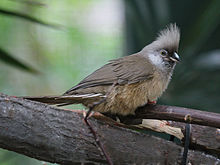Coraciimorphae
| Coraciimorphae | |
|---|---|

| |
| Speckled mousebird (Colius striatus) | |
| Scientific classification | |
| Domain: | Eukaryota |
| Kingdom: | Animalia |
| Phylum: | Chordata |
| Class: | Aves |
| Clade: | Telluraves |
| Clade: | Coraciimorphae Sibley & Ahlquist, 1990 |
| Subclades | |
Coraciimorphae is a clade of birds that contains the order Coliiformes (mousebirds) and the clade Cavitaves (a large assemblage of birds that includes woodpeckers, kingfishers and trogons).[2][3][4][5] The name however was coined in the 1990s by Sibley and Ahlquist based on their DNA-DNA hybridization studies conducted in the late 1970s and throughout the 1980s.[6] However their Coraciimorphae only contains Trogoniformes and Coraciiformes.
Taxonomy
[edit]| Coraciimorphae |
| ||||||||||||||||||||||||||||||
Cladogram of Coraciimorphae relationships based on Jarvis, E.D. et al. (2014)[5] with some clade names after Yuri, T. et al. (2013).[7]
References
[edit]- ^ Daniel T. Ksepka; Thomas A. Stidham; Thomas E. Williamson (2017). "Early Paleocene landbird supports rapid phylogenetic and morphological diversification of crown birds after the K–Pg mass extinction". Proceedings of the National Academy of Sciences of the United States of America. 114 (30): 8047–8052. Bibcode:2017PNAS..114.8047K. doi:10.1073/pnas.1700188114. PMC 5544281. PMID 28696285.
- ^ Hackett, S.J.; et al. (2008). "A Phylogenomic Study of Birds Reveals Their Evolutionary History". Science. 320 (5884): 1763–8. Bibcode:2008Sci...320.1763H. doi:10.1126/science.1157704. PMID 18583609. S2CID 6472805.
- ^ Ericson, P.G. (2012). "Evolution of terrestrial birds in three continents: biogeography and parallel radiations" (PDF). Journal of Biogeography. 39 (5): 813–824. Bibcode:2012JBiog..39..813E. doi:10.1111/j.1365-2699.2011.02650.x. S2CID 85599747.
- ^ Naish, D. (2012). "Birds." Pp. 379-423 in Brett-Surman, M.K., Holtz, T.R., and Farlow, J. O. (eds.), The Complete Dinosaur (Second Edition). Indiana University Press (Bloomington & Indianapolis).
- ^ a b Jarvis, E. D.; Mirarab, S.; Aberer, A. J.; et al. (2014). "Whole-genome analyses resolve early branches in the tree of life of modern birds". Science. 346 (6215): 1320–1331. Bibcode:2014Sci...346.1320J. doi:10.1126/science.1253451. PMC 4405904. PMID 25504713.
- ^ Sibley, Charles Gald & Ahlquist, Jon Edward (1990): Phylogeny and classification of birds. Yale University Press, New Haven, Conn.
- ^ Yuri, T.; et al. (2013). "Parsimony and Model-Based Analyses of Indels in Avian Nuclear Genes Reveal Congruent and Incongruent Phylogenetic Signals". Biology. 2 (1): 419–444. doi:10.3390/biology2010419. PMC 4009869. PMID 24832669.
